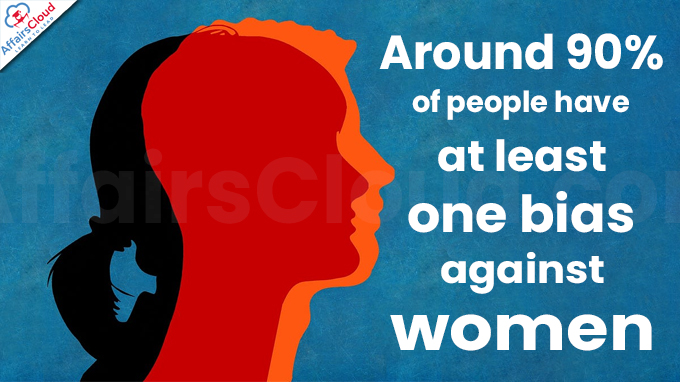 According to the United Nations Development Programme’s (UNDP) report ‘2023 Gender Social Norms Index (GSNI)- Breaking down gender biases: Shifting social norms towards gender equality‘, released on June 12, 2023, 90% of both men and women or almost 9 out of 10 men and women worldwide hold “at least one” fundamental bias against women.
According to the United Nations Development Programme’s (UNDP) report ‘2023 Gender Social Norms Index (GSNI)- Breaking down gender biases: Shifting social norms towards gender equality‘, released on June 12, 2023, 90% of both men and women or almost 9 out of 10 men and women worldwide hold “at least one” fundamental bias against women.
- There has been no progress on biases against women in the last decade. The report shows that despite the rise in women’s rights groups and social movements over the past decade or so, progress towards gender equality has stagnated.
- The publication of the 2023 GSNI was supported by financial contributions from the Republic of Korea (South Korea).
Highlights:
i.It is also worth noting that in 38 of the surveyed countries, people with “at least one bias” decreased to just 84.6% from 86.9%.
ii.Prejudices remain “deeply embedded” in society along with cultural biases and pressures that have continued to hinder women’s empowerment
iii.Nearly half the world’s people believe that men make better political leaders than women do, and two of five people believe that men make better business executives than women do.
- On average, the share of women as heads of state or heads of government has remained around 10% since 1995 and in the labour market women occupy less than a third of managerial positions.
iv.Gender biases are pronounced in both low and high Human Development Index (HDI) countries across regions, income, level of development and cultures.
v.Women are more skilled and educated than ever before, yet even in the 59 countries where women are now more educated than men, the average gender income gap remains a staggering 39% in favour of men.
vi.In countries with the highest levels of gender biases against women, it is estimated that women spend over 6 times as much time as men on unpaid care work.
vii.Only 27% of people believe that women having the same rights as men is essential for a democracy.
viii.25% of people or one in four respondents believes that a man beating his wife is justifiable.
ix.Some 28% believe that university is more important for men.
What is GSNI?
The Gender Social Norms Index (GSNI) captures beliefs on gender equality in capabilities and rights. First introduced in the 2019 Human Development Report.
It quantifies biases against women, capturing people’s attitudes toward women’s roles along four key dimensions: political, educational, economic and physical integrity. The index covers 85% of the global population.
Assessment:
The GSNI draws upon data from 91 countries, encompassing the World Values Survey (WVS) waves 5 (2005-2009), 6 (2010-2014), and 7 (2017-2022), with the latest update reflecting information as of 12 January 2023.
Recent Related News:
i.In February 2023, the United Nations Development Programme (UNDP) and ‘The Ocean Cleanup’ signed a Memorandum of Understanding (MoU) to work together to eliminate plastic pollution in the world’s oceans and rivers.
ii.According to the “Trade and Development Report Update: Global Trends and Prospects” (April 2023) report published by the United Nations Conference on Trade and Development (UNCTAD), India’s economic growth is projected to decline to 6% in 2023 from 6.6% in 2022.
About United Nations Development Programme (UNDP):
Administrator– Achim Steiner
Headquarters– New York, United States (US)




